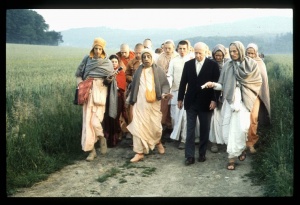CC Madhya 6.169: Difference between revisions
m (1 revision(s)) |
No edit summary |
||
| Line 1: | Line 1: | ||
{{ | [[Category:Sri Caitanya-caritamrta - Madhya-lila Chapter 06|C169]] | ||
<div style="float:left">'''[[Sri Caitanya-caritamrta|Śrī Caitanya-caritāmṛta]] - [[CC Madhya|Madhya-līlā]] - [[CC Madhya 6|Chapter 6: The Liberation of Sārvabhauma Bhaṭṭācārya]]'''</div> | |||
<div style="float:right">[[File:Go-previous.png|link=CC Madhya 6.168|Madhya-līlā 6.168]] '''[[CC Madhya 6.168|Madhya-līlā 6.168]] - [[CC Madhya 6.170|Madhya-līlā 6.170]]''' [[File:Go-next.png|link=CC Madhya 6.170|Madhya-līlā 6.170]]</div> | |||
{{CompareVersions|CC|Madhya 6.169|CC 1975|CC 1996}} | |||
{{RandomImage}} | |||
==== TEXT 169 ==== | ==== TEXT 169 ==== | ||
<div | <div class="verse"> | ||
jīvera nistāra lāgi’ sūtra kaila vyāsa | :jīvera nistāra lāgi’ sūtra kaila vyāsa | ||
māyāvādi-bhāṣya śunile haya sarva-nāśa | :māyāvādi-bhāṣya śunile haya sarva-nāśa | ||
</div> | </div> | ||
| Line 12: | Line 16: | ||
==== SYNONYMS ==== | ==== SYNONYMS ==== | ||
<div | <div class="synonyms"> | ||
''jīvera''—of the living entities; ''nistāra''—deliverance; ''lāgi’''—for the matter of; ''sūtra''—the ''Vedānta-sūtra''; ''kaila''—made; ''vyāsa''—Śrīla Vyāsadeva; ''māyāvādi''—of the impersonalists; ''bhāṣya''—commentary; ''śunile''—if hearing; ''haya''—becomes; ''sarva-nāśa''—all destruction. | |||
</div> | </div> | ||
| Line 19: | Line 23: | ||
==== TRANSLATION ==== | ==== TRANSLATION ==== | ||
<div | <div class="translation"> | ||
“Śrīla Vyāsadeva presented the Vedānta philosophy for the deliverance of conditioned souls, but if one hears the commentary of Śaṅkarācārya, everything is spoiled. | “Śrīla Vyāsadeva presented the Vedānta philosophy for the deliverance of conditioned souls, but if one hears the commentary of Śaṅkarācārya, everything is spoiled. | ||
</div> | </div> | ||
| Line 26: | Line 30: | ||
==== PURPORT ==== | ==== PURPORT ==== | ||
<div | <div class="purport"> | ||
Factually, the devotional service of the Lord is described in the Vedānta-sūtra, but the Māyāvādī philosophers, the Śaṅkarites, prepared a commentary known as Śārīraka-bhāṣya, in which the transcendental form of the Lord is denied. The Māyāvādī philosophers think that the living entity is identical with the Supreme Soul, Brahman. Their commentaries on the Vedānta-sūtra are completely opposed to the principle of devotional service. Caitanya Mahāprabhu therefore warns us to avoid these commentaries. If one indulges in hearing the Śaṅkarite Śārīraka-bhāṣya, he will certainly be bereft of all real knowledge. | Factually, the devotional service of the Lord is described in the ''Vedānta-sūtra'', but the Māyāvādī philosophers, the Śaṅkarites, prepared a commentary known as ''Śārīraka-bhāṣya'', in which the transcendental form of the Lord is denied. The Māyāvādī philosophers think that the living entity is identical with the Supreme Soul, Brahman. Their commentaries on the ''Vedānta-sūtra'' are completely opposed to the principle of devotional service. Caitanya Mahāprabhu therefore warns us to avoid these commentaries. If one indulges in hearing the Śaṅkarite ''Śārīraka-bhāṣya'', he will certainly be bereft of all real knowledge. | ||
The ambitious Māyāvādī philosophers desire to merge into the existence of the Lord, and this may be accepted as sāyujya-mukti. However, this form of mukti means denying one’s individual existence. In other words, it is a kind of spiritual suicide. This is absolutely opposed to the philosophy of bhakti-yoga. Bhakti-yoga offers immortality to the individual conditioned soul. If one follows the Māyāvādī philosophy, he misses his opportunity to become immortal after giving up the material body. The immortality of the individual person is the highest perfectional stage a living entity can attain. | The ambitious Māyāvādī philosophers desire to merge into the existence of the Lord, and this may be accepted as ''sāyujya-mukti''. However, this form of ''mukti'' means denying one’s individual existence. In other words, it is a kind of spiritual suicide. This is absolutely opposed to the philosophy of ''bhakti-yoga''. ''Bhakti-yoga'' offers immortality to the individual conditioned soul. If one follows the Māyāvādī philosophy, he misses his opportunity to become immortal after giving up the material body. The immortality of the individual person is the highest perfectional stage a living entity can attain. | ||
</div> | </div> | ||
__NOTOC__ | |||
<div style="float:right; clear:both;">[[File:Go-previous.png|link=CC Madhya 6.168|Madhya-līlā 6.168]] '''[[CC Madhya 6.168|Madhya-līlā 6.168]] - [[CC Madhya 6.170|Madhya-līlā 6.170]]''' [[File:Go-next.png|link=CC Madhya 6.170|Madhya-līlā 6.170]]</div> | |||
__NOTOC__ | |||
__NOEDITSECTION__ | |||
Revision as of 13:25, 29 July 2021

A.C. Bhaktivedanta Swami Prabhupada
TEXT 169
- jīvera nistāra lāgi’ sūtra kaila vyāsa
- māyāvādi-bhāṣya śunile haya sarva-nāśa
SYNONYMS
jīvera—of the living entities; nistāra—deliverance; lāgi’—for the matter of; sūtra—the Vedānta-sūtra; kaila—made; vyāsa—Śrīla Vyāsadeva; māyāvādi—of the impersonalists; bhāṣya—commentary; śunile—if hearing; haya—becomes; sarva-nāśa—all destruction.
TRANSLATION
“Śrīla Vyāsadeva presented the Vedānta philosophy for the deliverance of conditioned souls, but if one hears the commentary of Śaṅkarācārya, everything is spoiled.
PURPORT
Factually, the devotional service of the Lord is described in the Vedānta-sūtra, but the Māyāvādī philosophers, the Śaṅkarites, prepared a commentary known as Śārīraka-bhāṣya, in which the transcendental form of the Lord is denied. The Māyāvādī philosophers think that the living entity is identical with the Supreme Soul, Brahman. Their commentaries on the Vedānta-sūtra are completely opposed to the principle of devotional service. Caitanya Mahāprabhu therefore warns us to avoid these commentaries. If one indulges in hearing the Śaṅkarite Śārīraka-bhāṣya, he will certainly be bereft of all real knowledge.
The ambitious Māyāvādī philosophers desire to merge into the existence of the Lord, and this may be accepted as sāyujya-mukti. However, this form of mukti means denying one’s individual existence. In other words, it is a kind of spiritual suicide. This is absolutely opposed to the philosophy of bhakti-yoga. Bhakti-yoga offers immortality to the individual conditioned soul. If one follows the Māyāvādī philosophy, he misses his opportunity to become immortal after giving up the material body. The immortality of the individual person is the highest perfectional stage a living entity can attain.